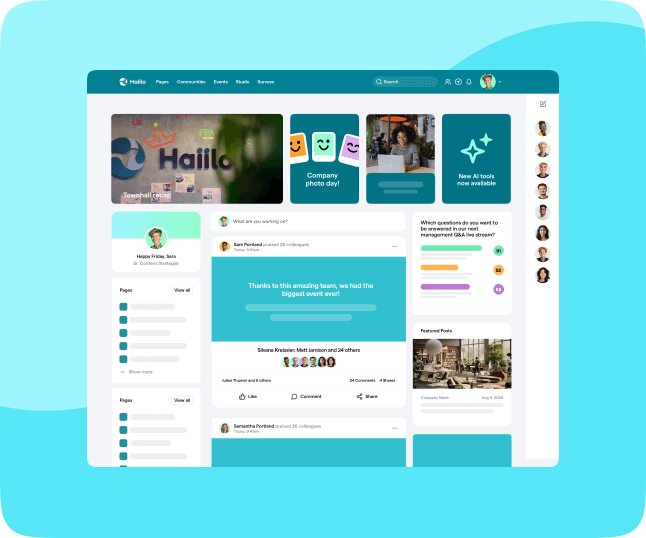Employee engagement is the key to improving employee productivity and loyalty in the workplace. Businesses with high employee engagement are 22% more profitable and have 18% higher retention rates. Yet only 20.8% of employees say they are engaged at work, and 16% are actively disengaged. That’s a pretty poor success rate.
If you want to improve employee engagement at your organization, start by looking at your corporate culture. Positive corporate culture has a great impact on employee motivation and happiness, while poor corporate culture drags down morale in the workplace and ultimately employee engagement.
If you’re ready to rethink your corporate culture, you need to tackle it from two angles:
- Create a positive culture of appreciation and support.
- Communicate that culture to your employees in an effective way.
Let’s dive in!
Creating a Positive Culture of Appreciation and Support
1. Promote Transparency and Open Employee Communication
By creating an open employee communication and encouraging your employees to share their stories, you’ll make your employees feel more confident all while helping them grow their thought leadership. This aspect of your company’s culture gives your employees a sense of pride, which, in turn, helps them feel invested in their work.
Creating an open employee communication also leads to a virtuous circle of engagement and advocacy, as employees who buy into a culture that promotes transparency and authenticity are more willing to advocate for their brand.

2. Express Appreciation
A TINYpulse report highlights that 21.5% of workers who don’t feel recognized for their hard work have been actively looking for a new job in the past three months, as opposed to 12.4% of workers who do feel recognized.
Building a corporate culture of appreciation is critical to your business success. You can achieve it by:
- Using your internal communication channels to express appreciation for individual hard work and team achievements
- Giving constructive feedback to your employees all while inspiring them
- Celebrating business successes with the entire workforce
- Actively looking for your employees’ strengths and finding ways to develop them
Employees who know that their efforts will be rewarded tend to innovate more often and are willing to work harder. Feeling a direct link between their work and business success adds meaning to what they’re doing. What’s more, everyone is more engaged when they feel that they hard work is recognized.
3. Support Your Employees
Employees who feel cared for, supported and trusted are more engaged and they naturally want to bring their best to the business. That’s why you need a corporate culture where employees feel seen and cared for.
Cultivating a culture of support requires:
- Setting up internal support systems like career mentoring, workshops and company gift baskets for employees who are going through transitions at work or in their personal lives, whether they’re on the cusp of promotion, changing departments, moving into a new house or anything else.
- Keeping people available and accountable for helping each other to get complex work initiatives done smoothly.
- Encouraging all managers to schedule face-to-face meetings and prioritize activities that strengthen human connections with employees. That way, managers will notice when an employee is looking tired, frustrated, or withdrawn, and activate your business’s support systems.
- Implementing an internal communication channel where employees can announce individual and team achievements. That way they can celebrate success all together and feel connected to the brand.
Communicating Your Corporate Culture
Once you’ve identified the key elements to creating a positive corporate culture, you’ll need to successfully communicate it both internally and externally. This is an ongoing effort – it doesn’t end once you’ve conveyed it to your workforce!

In order to maintain cultural alignment on an ongoing basis, make sure to:
- Use your internal communication channels to share content that educates your employees about the pillars of your corporate culture.
- Promote engaging content that sums up your corporate values in a memorable way: your employees can only internalize corporate culture if they can succinctly share it with their peers.
- Actively obtain and re-obtain corporate culture buy-in at the highest levels. Your top managers and executive leaders need to believe in your corporate culture. Otherwise, you won’t be able to drive engagement in the organization!
A Great Company Culture Naturally Raises Employee Engagement
When you focus on creating a positive corporate culture of appreciation, support, and open communication, improved employee engagement will follow naturally. Employees who feel part of a strong corporate culture feel a greater sense of belonging and pride. Remember that getting your employees excited about your company culture is critical to your business success! And to do so, you’ll need to effectively communicate your culture with your employees.





